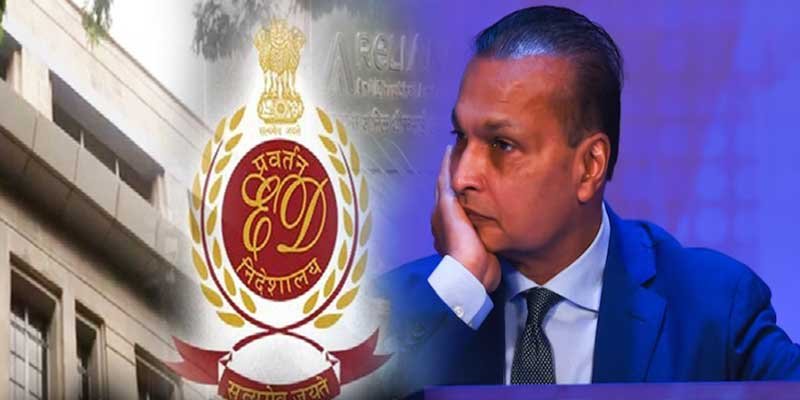Anil Ambani Under ED Scanner: Massive Raids in Mumbai, Delhi Over Yes Bank Case
The raids are part of an ongoing investigation into an alleged Rs 3,000 crore money laundering case tied to loans disbursed by Yes Bank......

MUMBAI/NEW DELHI– The Enforcement Directorate (ED) launched a massive search operation on Thursday, raiding approximately 35 to 50 locations across Mumbai and Delhi linked to businessman Anil Ambani and his Reliance Anil Dhirubhai Ambani Group (RAAGA) companies.
The raids are part of an ongoing investigation into an alleged Rs 3,000 crore money laundering case tied to loans disbursed by Yes Bank between 2017 and 2019, said media reports.
The ED’s operation, conducted under Section 17 of the Prevention of Money Laundering Act (PMLA), targeted over 50 companies and more than 25 individuals, including senior executives associated with Ambani’s group.
Also Read- Retired Punjab Police DIG Turns Chandigarh Streets Spotless with Daily Clean-Up Mission
The probe was initiated following two First Information Reports (FIRs) filed by the Central Bureau of Investigation (CBI), which alleged large-scale financial irregularities, including bribery of senior Yes Bank officials and diversion of public funds. Inputs from regulatory bodies such as the National Housing Bank, the Securities and Exchange Board of India (SEBI), the National Financial Reporting Authority (NFRA), and the Bank of Baroda further bolstered the investigation.
Preliminary findings by the ED point to a “well-planned and thought-out scheme” to siphon off public money by cheating banks, shareholders, and investors. The agency alleges that Yes Bank disbursed around Rs 3,000 crore in unsecured loans to RAAGA entities, including Reliance Home Finance Ltd (RHFL) and Reliance Communications (RCom), during the specified period.
Also Read- Jagdeep Dhankhar Resigns as Vice President of India Citing Health Concerns
Investigations revealed red flags such as loans issued to companies with poor financials, the use of common directors and addresses across multiple entities, missing documentation in sanction files, and instances of “loan evergreening”—where new loans were issued to repay existing ones to mask defaults.
The raids come shortly after the State Bank of India (SBI) classified Reliance Communications and Anil Ambani as “fraud” accounts on June 13, 2025, under the Reserve Bank of India’s fraud risk management guidelines.
Also Read- Congress MP Gaurav Gogoi Slams Centre Over Pahalgam Attack, Demands PM’s Response in Parliament
SBI, which reported the classification to the RBI on June 24, is preparing to lodge a formal complaint with the CBI. The bank’s exposure to RCom includes a principal amount of Rs 2,227.64 crore, plus interest and expenses since August 2016, and Rs 786.52 crore in bank guarantees.
Notably, Ambani’s personal residence in Mumbai was not part of the search operation, according to sources.
The ED also uncovered evidence suggesting a quid pro quo arrangement, with Yes Bank promoters allegedly receiving payments in their privately held entities just before sanctioning loans to RAAGA companies.
Also Read- Assam Police Seize Heroin Worth ₹6.22 Crore, Arrest Two in Major Drug Bust
The probe further extends to suspected foreign exchange violations under the Foreign Exchange Management Act (FEMA), with additional scrutiny on Reliance Group firms for past loan defaults and regulatory non-compliance.
Reliance Power and Reliance Infrastructure, part of Ambani’s group, issued a statement clarifying that the raids pertain to older cases involving other group entities and that they have no direct links to the matters under investigation. Neither Anil Ambani nor the Reliance Group has issued a formal comment on the ongoing raids.
The operation has sent shockwaves through India’s corporate and financial sectors, reigniting discussions about accountability in high-profile business dealings.
As the ED continues to examine records and question individuals, the investigation could lead to asset attachments or prosecutions under the PMLA if sufficient evidence is found. For now, the business community and investors await further developments in this high-stakes probe.









